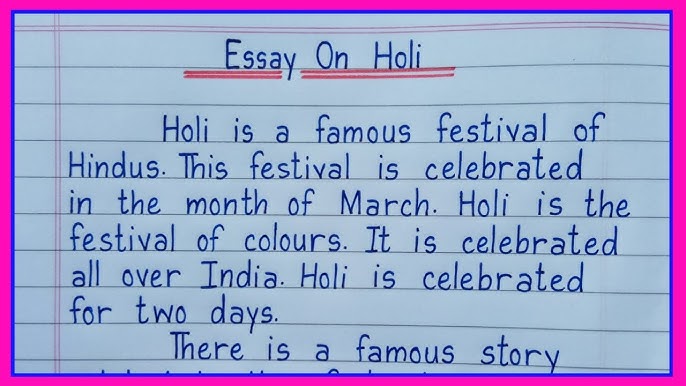Holi Par Nibandh: होली भारत का एक प्रमुख त्योहार है, जिसे रंगों का त्योहार भी कहा जाता है। यह त्योहार हर वर्ष फाल्गुन महीने की पूर्णिमा को मनाया जाता है। होली पर निबंध हमें इस त्योहार की महत्वता और सांस्कृतिक विविधता को समझने का मौका देता है। लोग इस दिन अपने गिले-शिकवे दूर करते हैं और एक-दूसरे के साथ रंग खेलते हैं। होली का त्यौहार हमें एकता, भाईचारे और प्रेम का संदेश देता है। यह न केवल रंगों के उल्लास का प्रतीक है, बल्कि जीवन में खुशी और उमंग लाने का भी एक माध्यम है।
Holi par Nibandh: A Festival of Colors and Joy
Holi, also known as the festival of colors, is a vibrant and joyous celebration observed by Hindus around the world. The streets fill with laughter and music as friends and family members chase each other, spreading cheer and love.
During Holi, people gather to share traditional sweets and snacks, dance to festive music, and exchange warm wishes. It is a time for forgiveness and reconciliation, with old grievances being set aside in the spirit of renewal and harmony. The festival also holds religious significance, with prayers and rituals performed to seek blessings for a prosperous and peaceful year ahead.
Holi transcends social barriers and brings people of all ages, communities, and backgrounds together in a spirit of unity and camaraderie. It is a time to let go of inhibitions, embrace spontaneity, and celebrate life with zest and enthusiasm. With its kaleidoscope of colors and infectious energy, Holi truly embodies the essence of love, happiness, and togetherness.
Significance of Holi: An Essay on the Festival of Love and Unity
Holi, also known as the Festival of Colors, holds immense significance in Indian culture. It is a time when people come together to celebrate love, unity, and the triumph of good over evil.
During Holi, people gather to play with vibrant colored powders, symbolizing the shedding of inhibitions and social boundaries. It is a time for people to forget past grievances and come together in a spirit of joy and camaraderie.
Holi also has a mythological significance, with the legend of Holika Dahan symbolizing the victory of good over evil. The festival honors the virtues of love, kindness, and unity, reminding people to embrace the diversity and richness of human relationships. Overall, Holi reinforces the message of peace and harmony, spreading joy and positivity among all those who participate in the festivities.
Holi Par Nibandh Essay in English: Celebrating the Triumph of Good over Evil
Holi is a colorful and joyous festival celebrated by Hindus across India and other parts of the world. This festival marks the victory of good over evil, symbolized by the burning of the demoness Holika.
Holi is a time for forgiveness, healing relationships, and letting go of past grievances. It is a time for people to come together in unity and spread love and joy. The festival also signifies the arrival of spring, a season of renewal and growth. Holi is a time to celebrate life and all the good things it has to offer.
Overall, Holi is a time of joy, laughter, and togetherness. It is a time to forget the worries and troubles of the past and embrace the present moment.
Holi: A Cultural Extravaganza in India – An Essay on the Vibrant Festival
Holi, also known as the festival of colors, is one of the most vibrant and joyous celebrations in India. It marks the arrival of spring and the victory of good over evil.
The festival is a cultural extravaganza that brings people closer and breaks down social barriers. People of all ages participate in the festivities, making it a truly inclusive and memorable experience.
Holi is not just about playing with colors, but it also holds a deeper significance in Indian mythology and history. It is a time to reflect on the triumph of good over evil, as symbolized by the burning of Holika, a mythological demon. The festival also serves as a reminder to let go of past grievances and start afresh with renewed joy and positivity.
National festivals are vibrant celebrations that reflect a country’s unique culture and heritage. These events unite communities, showcasing traditions, music, dance, and cuisine. National festivals often have historical significance, commemorating important events or figures. They offer a wonderful opportunity for people to connect with their roots and share their cultural pride. Participating in national festivals can enhance understanding of a country’s history and diversity.
Fire and Ice Summary is a powerful poem by Robert Frost that explores the destructive nature of human emotions. The poem reflects on how the world might end, either by fire, symbolizing desire, or by ice, representing hatred. Frost uses these elements to show how both extremes—passionate desire and cold indifference—can lead to destruction. He leaves the interpretation open to suggest that either fire or ice could be equally catastrophic. The concise yet impactful language makes “Fire and Ice” a timeless reflection on the duality of human emotions and their potential consequences.






[…] Holi Par Nibandh […]